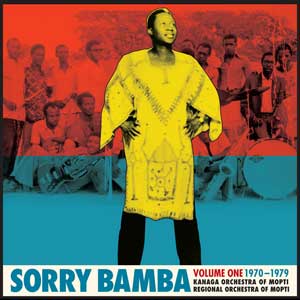Reviews July 7, 2011
Sorry Bamba: Volume One 1970-1979
The state-sponsored bands of Mali and Guinea in the early years of independence are legendary. Bandleader Sorry Bamba of Mopti, a crossroads city at the confluence of the Niger and Bani Rivers north of Bamako, is an exceptional case within that story. Mopti, once called “The Venice of Mali” was a place where Mande, Fula, Dogon, Bambara, Bobo, Bozo and other ethnicities rubbed shoulders. Bamba’s noble father had fought the French alongside Samory Toure in Guinea, so a career in music was not in the cards. But in 1957, on the eve of Malian independence, he had already transgressed that taboo to form his first ensemble. He was a man ready to make history.
Sorry Bamba became a major player in the new music of Mali, eventually leading the Regional Orchestra of Mopti (later renamed Bani Jazz). This CD, compiled with Bamba’s involvement, samples his work in two bands between 1970 and 1979, a heyday for West African electric roots music. As the Rail Band was reinventing Mande music in Bamako, and Super Biton was doing the same for Bambara music in Segou, Sorry Bamba’s groups too were finding ways to fuse and update the rich traditions of the Mopti region.
The ten tracks here cover a lot of ground, from the obligatory nod to Cuban grooves (“Astan Kelly” and “Aïssé”) to slow, smoldering numbers rich with brisk brass work and biting guitar solos (“Sekou Amadou” and “Gambari”) to gorgeous orchestrations of melodious folklore comparable to the best of the era’s Mande pop bands. With its funky beat and distorted guitar, “Bayadjourou” is a Malian answer to the psychedelic funk sound gaining traction in Ghana and Nigeria around this same time.
A few things distinguish the Sorry Bamba sound. For starters, there’s Bamba’s fluid soloing on wooden flute, as on the floating 6/8 number “Boro.” A shimmering organ vamp adds a surreal, otherworldly atmosphere on a number of songs. And the percussion is particularly sharp, featuring metallic sounds mixed with wood and skin of traditional drums. All these elements make for a marked richness in the high end of the frequency spectrum, and overall, help to define a distinctive realm of Malian roots pop—one rarely heard before this release.
Two tracks deserve special mention. Topping ten minutes, “Porry” begins with the seductive weave of electric guitar, quivering organ, and the easy undulation of unstoppable rhythm. A bracing trumpet solo clears the way for a particularly strong vocal that ultimately gives way to a steamy, beautifully phrased guitar solo—all just sublime. And “Sare Mabo,” the closing track, is a sizzling 6/8 swirl of crisply cycling guitars, intertwined brass and vocals, with female voices prominent, and percolating percussion. Bamba’s fluttering flute solo is a high point. The song’s tonality is sweet, but tinged with an air of melancholy, all of which helps to conjure the feeling of a lost era.
The good news is that Sorry Bamba is not lost. He’s still with us, and one hopes, may pull together a band to tour in the future. This is an act well poised for an exciting comeback!
-Banning Eyre








